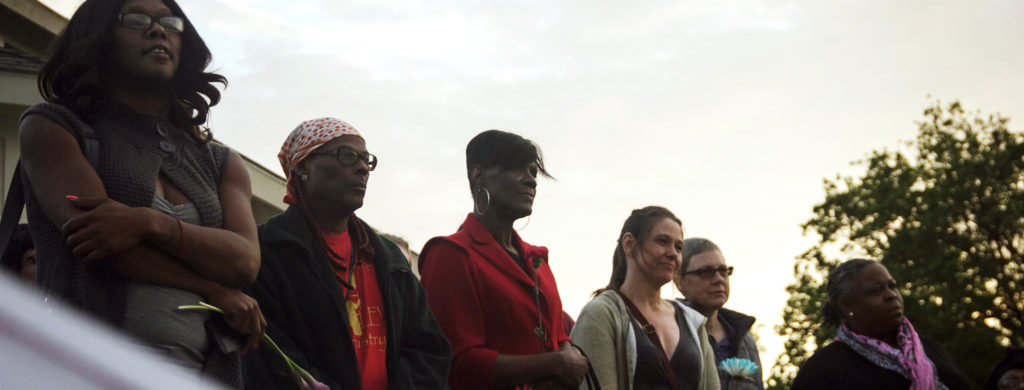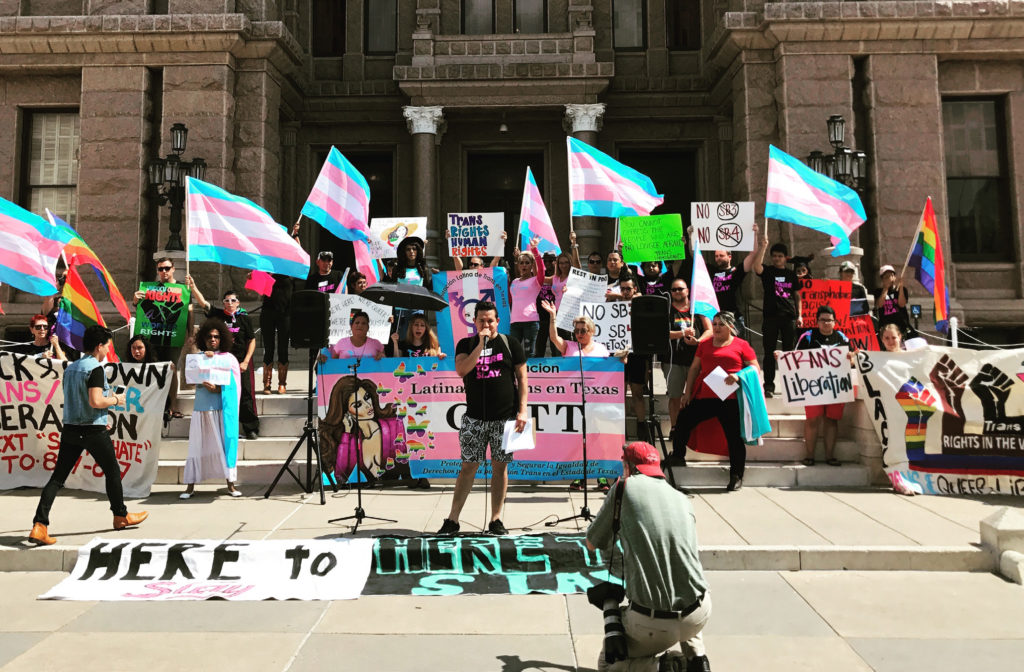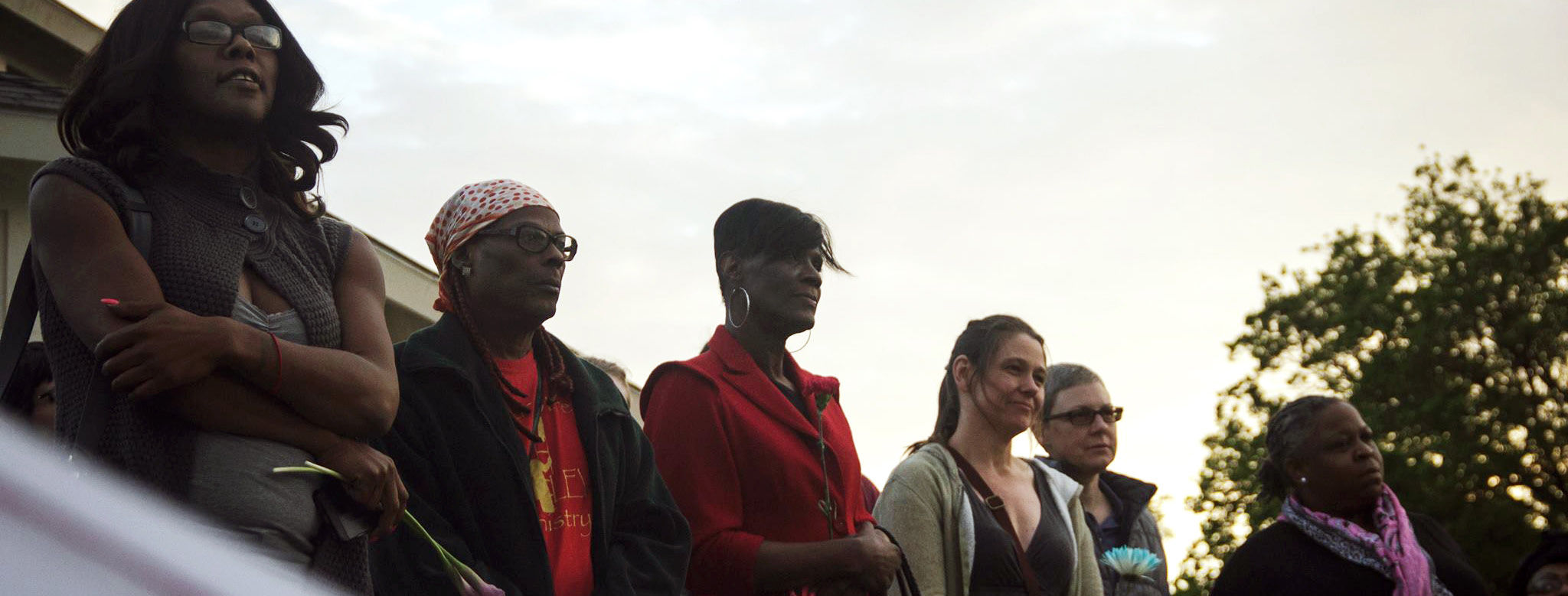A Southern Trans Report Prioritizing Issues Impacting Transgender, Gender Nonbinary, and Gender Nonconforming Southerners.
A Report by TLC @ SONG
Special thanks to: Micky B for conceptualizing this report during her time as the TLC@SONG regional organizer; survey respondents who took time to share the issues impacting them and making their voices heard; organizations and people who took part in the Jewel Revue Tour and who helped amplify the GrapeVine Survey; and to Serena Sebring, Kate Shapiro, Micky Jordan, Bia Jackson, Carlin Rushing, Mary Hooks, Emily Waters, Jill Marcellus, Shelby Chestnut, Ali Gali, Isa Noyola, and Kayla Gore.

ABOUT TLC @ SONG
Southerners on New Ground
TLC@SONG, formed in 2014, is a national collaboration based in Atlanta, GA. The collaboration joins Transgender Law Center’s long history of legal, policy and trans-specific expertise with Southerners on New Ground’s well respected southern base-building and organizing shop. TLC@SONG focuses on policy advocacy, legal work, public education and movement building.
- For more information on Transgender Law Center (TLC), please visit Transgender Law Center
- or follow TLC on social media: @translawcenter
- For more information on Southerners on New Ground (SONG), please visit Southerners on New Ground.
- or follow SONG on social media: @Ignitekindred
The GrapeVine: A Southern Trans Report
A Southern Trans Report Prioritizing Issues Impacting Transgender, Gender Nonbinary, and Gender Nonconforming Southerners.
The GrapeVine is a community survey of trans and gender nonconforming communities across the South. Growing up gender nonconforming in the South means finding ways to connect despite isolation. We have always found ways to rebel, scheme, and dream together.
Southern transgender, gender nonbinary, and gender nonconforming (TGNC) people experience high rates of discrimination and violence and have long been lacking in the resources, scholarship, and research to combat these issues. In order to truly and effectively decrease the disparities impacting TGNC Southerners, resources and efforts must be grounded in the experiences of and led by TGNC communities in the South. While there is more and more awareness of issues impacting TGNC communities, there is less data on which issues TGNC communities view as priorities and needs, particularly TGNC communities in the South.
The Grapevine: A Southern Trans Report details the findings of one of the only community-based surveys of TGNC Southerners to date focused on collecting information on the issues TGNC Southerners identify as priorities. The survey was developed out of The Jewel Box Revue — a listening tour that collected stories from and built connections among TGNC Southerners. This report contains information from 135 TGNC people from 13 Southern states, including West Virginia, Mississippi, Texas, Tennessee, Virginia, Alabama, Louisiana, South Carolina, Georgia, Florida, North Carolina, Missouri, and Kentucky. Most respondents completed the survey online, while some were completed in person at target events in the South such as Southern Fried Queer Pride in Durham.
This report can be used as a roadmap for local organizing, policy, and funding priorities for future work that will increase the rich and often under-recognized leadership of directly impacted communities in the South.
Description of Survey Respondents
Legend
* = Survey respondents were able to choose more than one identity in order to best reflect their identities and experiences.
** = Black Africans migrants are just one part of the broader Black migrant community and populations in the US; others hail from the Caribbean and South and Central America for instance.
| Gender Identity (n=135)* | n | % |
|---|---|---|
| Trans Masculine | 27 | 20% |
| Trans Feminine | 14 | 10% |
| Drag Performer | 12 | 9% |
| Gender Indigenous | 6 | 4% |
| Gender nonbinary | 42 | 31% |
| Gender none | 16 | 12% |
| Trans man | 22 | 16% |
| Trans woman | 43 | 32% |
| Trans Masculine | 37 | 27% |
| Sexual orientation (n=135)* | n | % |
|---|---|---|
| Pansexual | 20 | 15% |
| Bisexual | 22 | 16% |
| Gay | 38 | 28% |
| Straight | 21 | 16% |
| Lesbian | 18 | 13% |
| Queer | 60 | 44% |
| Other | 20 | 15% |
| Age (n=135)* | n | % |
|---|---|---|
| 13-17 | 2 | 1% |
| 18-25 | 36 | 27% |
| 26-30 | 27 | 20% |
| 30-35 | 25 | 19% |
| 35-45 | 30 | 22% |
| 45-55 | 7 | 5% |
| 55+ | 8 | 6% |
| Race/Ethnicity (n=135)* | n | % |
|---|---|---|
| Black | 50 | 37% |
| Black African | 5 | 4% |
| Indigenous or first nations | 8 | 6% |
| Middle Eastern | 2 | 1% |
| API | 3 | 2% |
| Latinx | 11 | 8% |
| Multiracial | 12 | 9% |
| White | 68 | 50% |
The global impacts of United States imperialism have increased, causing an onslaught of oppression that disproportionately impacts Black LGBTQ+ migrants internationally, via rigged elections in Black majority countries, military occupations, war, wealth theft, and environmental oppression. All of these factors cause an upsurge of forced migration and xenophobia. Trauma happens at all of these points of forced migration, sometimes in sequence or parallel to one another, but always intersecting. Black LGBTQ+ migrants find themselves cornered by the risks of both migration and of remaining in their place of origin. As organizing for LGBTQ rights intensifies in Africa, the Caribbean, South & Central America, etc., so will the numbers of us forced to flee. 38 out of 54 African countries criminalize homosexuality. In Nigeria for instance, the penalty is a 14 year sentence. When we flee, we are detained while seeking asylum at U.S. borders. After we are detained, we become 15 times more likely to be assaulted while in detention, and typically the last to receive legal representation. While the number of Black migrants crossing at the border is the highest it’s ever been, Black LGBTQ+ migrants remain at the margins of the margins.
Lived Experiences of TGNC Southerners
12%
of survey respondents were not sure of their HIV status or had never taken an HIV test.
15%
of survey respondents were HIV positive and a little more than half reported they had an undetectable viral load.
72%
of the respondents reported an income of $45,000 or less.
12%
of survey respondents were either currently or formerly incarcerated.
To [change my identity documents] would out myself to my dad who pays for my medical insurance.
Raleigh, North Carolina
40%
of survey respondents had updated their driver’s license to reflect their gender identity.
12%
of the respondents had updated their birth certificate to reflect their gender identity.
I’ve gotten my name change approved by a judge but need to go back to change my gender marker and I’m trying to find the time to get to make the ridiculous amount of doctors appointments, calls, and DMV visits required to have updated documents which I probably can’t afford.
Snellville, Georgia
40%
of survey respondents had updated their driver’s license to reflect their gender identity.
Gender neutral/nonconforming identities aren’t supported in this state, only binary identities.
New Orleans, Louisiana
47%
of participants reported experiencing high levels of violence by strangers. (1)
58%
of trans women and femmes reported experiencing high levels of violence by strangers. (2)
We walked through downtown Selma as a crew of Black transwomen and the fear was constant. We felt many eyes on ourselves as we were out in public, worried about violence coming from anywhere — and we would have no recourse.
Selma, Alabama (3)
41%
of participants reported
experiencing high levels of violence by law enforcement. (4)
52%
of participants of color reported
experiencing high levels of
violence by law enforcement. (5)
40%
of participants reported experiencing high levels of violence by health care providers. (6)
References
(1) n=116
(2) n=40, includes participants who identified as femme, trans women, and those who identified similar identities when asked to describe their gender identity in the “other” section.
(3) Quote is from a list ening tour in which TLC and Song listened to the experiences of TGNC Southerners and collected stories. This quote is not from the GrapeVine survey.
(4) n=102
(5) n=42, participants of color includes participants who identified as one or more of the following racial or ethnic identities: Black, Black African, Indigenous, Latinx, Middle Eastern, and Multiracial.
(6) n=103
(7) n=135
Priority Issue Areas for TGNC Southerners
Which issues do you think affect enough Trans/GNC people in your Town/City that people would be moved to come together to create change?
Participants were asked to choose the top issue impacting and motivating TGNC people in their community. They were presented a list of issues to choose from, including: primary care and HIV-inclusive healthcare; law enforcement accountability; ending money bail (pre-trial incarceration); and deportation and detention. Participants could also choose ‘other’ and write in other issues that impact TGNC Southerners in their community.
44%
of participants identified primary care and HIV-inclusive health care as the
top issue that impacts their community and that they would be interested in
motivating to change.
21%
of participants identified law
enforcement accountability as
the top issue that impacts
their community. (7)
I cannot stress more how important and nonexistent basic health care is.
New Orleans, Louisiana
Primary care and HIV-inclusive health care was the top chosen issue across gender identities and racial or ethnic identities. However more gender nonbinary and gender nonconforming participants (29%) chose law enforcement accountability compared to trans women and femmes (19%) and trans men and masculine (17%) participants.
Participants were also able to choose ‘other’ and identify different issues they thought their community would be motivated to impact. Top issues identified by participants include education, ending discrimination, and changing social norms to be more accepting of TGNC people.
In the state of North Carolina almost all discrimination against trans men and women is legal. I could get fired from a job just for being trans and I can’t do anything, I can get kicked out places, banned, etc
North Carolina
Which of these issues move you to gather your community and create change?
Participants were also asked to choose from a list of issues they themselves would be most motivated to address. The list of issues included: primary care and HIV-inclusive healthcare; law enforcement accountability; ending money bail (pre-trial incarceration); and deportation and detention. Participants were able to choose more than one issue area. Primary care and HIV inclusive healthcare was still the top issue chosen, but a higher percentage of participants chose other issues as well when able to choose more than one.
75%
of participants identified primary care and HIV-inclusive health care as an issue that they themselves would gather their community to change.
64%
identified law enforcement accountability, 50% identified ending money bail, and 42% chose deportation and detention as top issues they would be interested in working on in their communities.
Participants were also able to write in other issues. Of the total participants, 18% chose to write in an additional issue area. Of those, the most commonly described issues included equal rights and non-discrimination, homelessness, and education.
Basic needs still aren’t being met for transwomen and transfemmes to the point where my friends shift the same $12-$40 between each other in an attempt not to spiral out of barely stable living situations, if primary care started with basic needs it’d probably move a lot folks.
Snellville, Georgia
TGNC Southerners’ Fuel for Resistance
What Practices, Rituals, Images, Sounds, or Tastes, etc. Fuel Your Everyday Resistance?

Participants were asked what helps fuel their everyday resistance. While supporting the leadership of TGNC Southerners to impact change in their communities, it is vital that resources are also dedicated to supporting healing and supportive practices.
Coffee and quiet time at sunrise.
Virginia
Caring for my kids.
Raymond, Mississippi
Asserting my boundaries and telling people what I desire. Being okay with being messy and mad.
Richmond, Virginia
Playing music, performing standup comedy, being open in public.
Memphis, Tennessee
Challenging my biases, examining my privilege, sharing meals and beers, cuddling up to my cat, and sleeping to refuel.
Durham, North Carolina
Walking outside in the world. Loving community through it. Lots of music, especially blues. Lots of gumbo and other Creole cooking that makes me feel like home.
New Orleans, Louisiana
We dig deep. We do the work. We share food, we house protesters, people visiting for workshops, people passing through. We spread quilts on extra mattresses for guests; we give them cornbread and sweet coffee and say see you next time, brother; solidarity sister. Be loved. Be safe. Be safe.
Knoxville, Tennessee
I read and repeat daily affirmations to myself and try to do little things to help me feel more feminine until I can start HRT.
Jacksonville, Mississippi
Conclusion

While we have seen a great deal of advancements for transgender rights generally, we must still grapple with issues impacting so many TGNC community members. These include the epidemic of violence taking the lives of young Black transgender women; the lack of access to basic resources, such as healthcare; the state’s reliance on detention in responding to migrant transgender people, especially transgender women, as they seek immigration relief in this country; and the increased criminalization, targeting, and attacks on Black and brown. TGNC communities of color, especially in the South, continue to be underfunded and their leadership undervalued. We know that more resources and attention are needed to address the disparities impacting TGNC Southerners. However, these resources must be geared toward issues that TGNC Southerners themselves identify as priorities. The leadership and resilience of TGNC Southerners must be supported in order to truly effect change. We hope that this report will be used to direct resource to those issues identified by TGNC Southerners themselves. We hope that this report will add a little fuel to the resistance.
Information on Affirming Resources and Services for TGNC Southerners
Trans in the South: A Guide to Resources and Services is a comprehensive resource for TGNC people looking for affirming mental health, primary and HIV health care, and other trans affirming services in the South. The guide was developed by the Campaign for Southern Equality.

